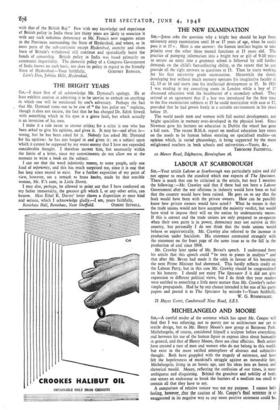THE BRIGHT YEARS
SIR,—I must first of all acknowledge Mr. Dymond's apology. He at least exhibits caution in admitting it to be unwise to embark on anything in which one will be outclassed by one's adversary. Perhaps the fact that Mr. Dymond turns out to be one of "the less polite sex" explains, though it does not excuse, the fact that he has charged Dr. Edith Sitwell with something which in his eyes is a grave fault, but which actually is an invention of his own.
I make it a rule never to answer critics; for a critic is one who has been asked to give his opinion, and gives it. It may be—and often is— wrong, but he has been asked for it. Nobody has asked Mr. Dymond for his opinion: he has just barged in and given it: on a subject upon which it cannot be supposed by my worst enemy that I have not expended considerable thought. I therefore answer him, but necessarily within the limits of a letter, since my commitments do not allow me at the moment to write a book on the subject.
I can see that the word inferiority means, to some people, only one kind of inferiority, and this has much surprised me, since it is on that has long since ceased to exist. For a further exposition of my point of view, however, see a remark re brass knobs, made by that sensible woman, Mr. F.'s aunt, in Little Dorrit.
I may also, perhaps, be allowed to point out that I have conferred on my father immortality, the greatest gift which I, or any other artist, can bestow. Miss Ethel K. Davies' letter shows a disposition at once kind and serious, which I acknowledge gladly.—I am, yours faithfully, Renishaw Hall, Renishaw, Near Sheffield. OSBERT SITWELL.


































 Previous page
Previous page